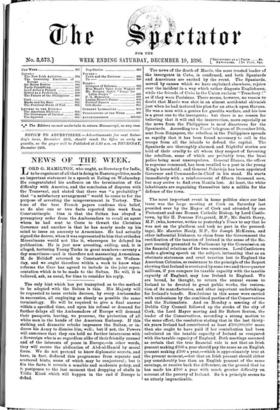The most important event in home politics since our last
issue was the large meeting at Cork on Saturday last presided over by the Mayor of Cork and attended by one Protestant and one Roman Catholic Bishop, by Lord Castle. town, by Sir H. Penrose Fitzgerald, M.P., Mr. Smith Barry, M.P. (who, however, writes to yesterday's Times to say that he was not on the platform and took no part in the proceed- ings), Mr. Maurice Healy, M.P., Sir Joseph McKenna, and other influential Irishmen, to claim from the Government the rectification of the taxation of Ireland in the sense of the Re- port recently presented to Parliament by the Commission on the financial relations of the two countries. Lord Castletown made a glowing speech on the subject, intimating that as an obstinate statesman and cruel taxation lost to England the American Colonies, so resistance to the principle of the Report showing thatIreland is overtaxed by some two and three-quarter millions, if you compare its taxable capacity with the taxable capacity of England, may lose Ireland to England. We are bound, he thought, to return the annual excess to Ireland to be devoted to great public works, the restora- tion of its manufactories, and other important undertakings for Ireland's benefit. Resolutions in this sense were carried with enthusiasm by the combined parties of the Conservatives and the Nationalists. And on Monday a meeting of the Dublin City Council followed up the stroke of the city of Cork, the Lord Mayor moving and Sir Robert Sexton, the leader of the Conservatives, seconding a strong motion to the same effect, the resolution stating that in the last thirty- six years Ireland had contributed at least 2100,000,000 more than she ought to have paid if her contribution had been calculated on the taxable capacity of Ireland as compared with the taxable capacity of England. Both meetings assumed as certain that the true financial rule is not that an Irish peasant making 2100 a year should pay the same as an English peasant making £100 a year,—which is approximately true at the present moment,—but that an Irish peasant should either pay considerably less than an English peasant of the same earnings, or receive back the difference, on the ground that be has made his £100 a year with much greater difficulty on account of the poverty of Ireland. Su-h a principle seems to us utterly impracticable.










































